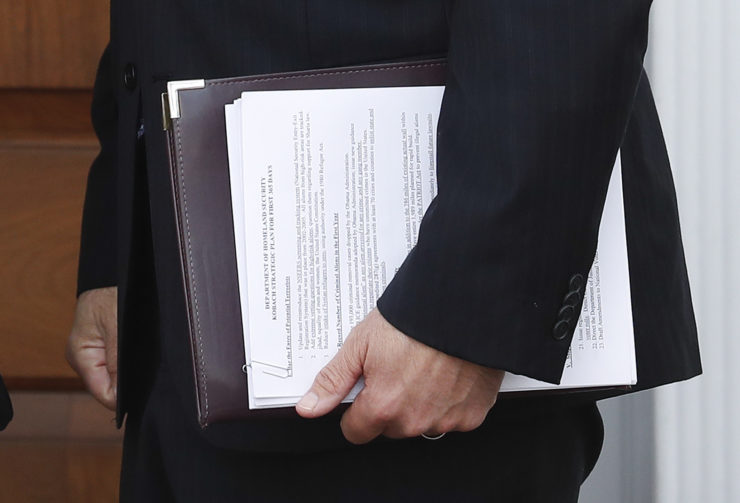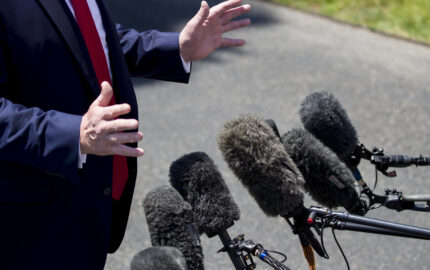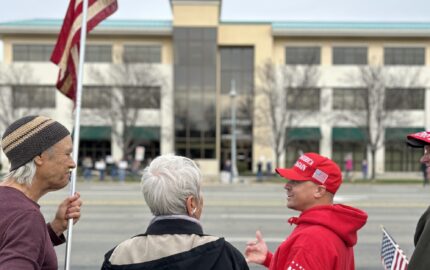Two days after the election, one of our reporters spoke to teenagers at Topeka High School who said they were bullied and threatened with Donald Trump-inspired sexual assault.
The story angered Diane Smith, a reader who fired off an email to our reporter. "It is the media, including this paper," Smith wrote, "that daily told the world that Trump was the devil, and anyone who supported him was stupid, evil, sexist, homophobic and any other pejorative you could think of. So I lay this anxiety and hysteria of these delicate snowflakes at the feet of all the media who created this problem."
A week later, student anxiety would manifest in a flurry of delicate snowflakes marching to the Statehouse.
By the time Smith snarled her way into our inbox, we had long been baptized in media contempt. In addition to political coverage — as managing editor of The Topeka Capital-Journal, I hear from people every week who accuse us in turn of being biased liberals and conservatives — flashpoints for outrage include photos from fatal traffic accidents, exact addresses of structures impacted by storm damage, and the revelation that a dance instructor had been convicted of a sex crime involving a child. While defending our coverage of a teen’s suicide, a caller told me she hoped someone close to me would die.
This election cycle intensified rhetoric, evident in Facebook comments posted on stories in Topeka, as well as in photos surfacing of Trump supporters in Minnesota wearing T-shirts that read: “Rope. Tree. Journalist. Some assembly required.” Sometimes, we invited rebuke. The day those photos emerged, this newspaper, under corporate direction, endorsed Trump, ensuring we would be scrutinized as well by the president-elect’s detractors.
Our salvation is to inform, expose, fact check, and explain. But it won’t shield us from an increasingly skeptical public.
Shortly after the election, a prominent Kansas think tank with ties to the Koch brothers announced it was launching a news service inspired by a need to hold media accountable. In December, Kansas Governor Sam Brownback’s spokeswoman Melika Willoughby reveled in media bashing via her “grassroots” newsletter. As we reported on members of Brownback’s own party becoming increasingly critical of the state’s budget problems, Willoughby blasted “media imaginations” and deafening hypocrisy.
More recently, when we reported leadership problems in the Kansas National Guard, as revealed by its own audit, the governor dismissed evidence of racial slurs, recruitment fraud, and falsified documents as our opinion. In an effort to preempt our story, a letter from Major General Lee Tafanelli, appointed adjutant general by Brownback, provoked a short-lived #cjdoesntspeakforme hashtag. We continued to listen, and report. Within a week, Tafanelli asked for a federal review.
We take pride in holding public officials accountable but squirm when we become the subject of conversation. If you’re reading this, you probably know your way around a newsroom. How often have your heard a reporter vow to stop reading the comments section? And how often do you see reporters use those comments as an opportunity to engage with readers, to re-focus the conversation, to answer questions, and to explain what we do?
I refuse to see this as a troubling time for journalism. For all our hand-wringing and introspection, has anyone seen a decline in relevance?
In late November, an alert reporter in our newsroom took notice of an Associated Press photo of Kansas Secretary of State Kris Kobach arriving to meet the president-elect. When the photo was enlarged, a portion of Kobach’s plan for the Department of Homeland Security could be easily read. The story brought 150,000 new readers to our website.
I received another email from Diane Smith, our angry reader, who had questions about the tone of Trump-related stories and the number of reporters in a national poll who say they are left-leaning. We exchanged a half-dozen emails before resolving our differences.
"Your points are taken,” she wrote. “I will try to be more careful."
The story angered Diane Smith, a reader who fired off an email to our reporter. "It is the media, including this paper," Smith wrote, "that daily told the world that Trump was the devil, and anyone who supported him was stupid, evil, sexist, homophobic and any other pejorative you could think of. So I lay this anxiety and hysteria of these delicate snowflakes at the feet of all the media who created this problem."
A week later, student anxiety would manifest in a flurry of delicate snowflakes marching to the Statehouse.
By the time Smith snarled her way into our inbox, we had long been baptized in media contempt. In addition to political coverage — as managing editor of The Topeka Capital-Journal, I hear from people every week who accuse us in turn of being biased liberals and conservatives — flashpoints for outrage include photos from fatal traffic accidents, exact addresses of structures impacted by storm damage, and the revelation that a dance instructor had been convicted of a sex crime involving a child. While defending our coverage of a teen’s suicide, a caller told me she hoped someone close to me would die.
This election cycle intensified rhetoric, evident in Facebook comments posted on stories in Topeka, as well as in photos surfacing of Trump supporters in Minnesota wearing T-shirts that read: “Rope. Tree. Journalist. Some assembly required.” Sometimes, we invited rebuke. The day those photos emerged, this newspaper, under corporate direction, endorsed Trump, ensuring we would be scrutinized as well by the president-elect’s detractors.
Our salvation is to inform, expose, fact check, and explain. But it won’t shield us from an increasingly skeptical public.
Shortly after the election, a prominent Kansas think tank with ties to the Koch brothers announced it was launching a news service inspired by a need to hold media accountable. In December, Kansas Governor Sam Brownback’s spokeswoman Melika Willoughby reveled in media bashing via her “grassroots” newsletter. As we reported on members of Brownback’s own party becoming increasingly critical of the state’s budget problems, Willoughby blasted “media imaginations” and deafening hypocrisy.
More recently, when we reported leadership problems in the Kansas National Guard, as revealed by its own audit, the governor dismissed evidence of racial slurs, recruitment fraud, and falsified documents as our opinion. In an effort to preempt our story, a letter from Major General Lee Tafanelli, appointed adjutant general by Brownback, provoked a short-lived #cjdoesntspeakforme hashtag. We continued to listen, and report. Within a week, Tafanelli asked for a federal review.
We take pride in holding public officials accountable but squirm when we become the subject of conversation. If you’re reading this, you probably know your way around a newsroom. How often have your heard a reporter vow to stop reading the comments section? And how often do you see reporters use those comments as an opportunity to engage with readers, to re-focus the conversation, to answer questions, and to explain what we do?
I refuse to see this as a troubling time for journalism. For all our hand-wringing and introspection, has anyone seen a decline in relevance?
In late November, an alert reporter in our newsroom took notice of an Associated Press photo of Kansas Secretary of State Kris Kobach arriving to meet the president-elect. When the photo was enlarged, a portion of Kobach’s plan for the Department of Homeland Security could be easily read. The story brought 150,000 new readers to our website.
I received another email from Diane Smith, our angry reader, who had questions about the tone of Trump-related stories and the number of reporters in a national poll who say they are left-leaning. We exchanged a half-dozen emails before resolving our differences.
"Your points are taken,” she wrote. “I will try to be more careful."



